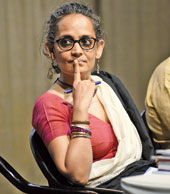 |
| Anuradha Koirala. Picture by Anindya Shankar Ray |
Anuradha Koirala was born into a prosperous Nepali family. Life took an unexpected, ugly turn after her marriage, when her husband turned abusive. She separated from him, taking their only child, a son, with her.
For peace of mind, she used to visit the Pashupatinath temple in Kathmandu, where now her eyes rested on the numerous women who sat with begging bowls. She asked them if they would work; they all said yes. Anuradha gave ten of them Rs 1,000 each — a school teacher, she earned Rs 7,000 every month — and every woman was asked to start a naglo pasal, a small street shop. Then she took their children in, into her house.
That was how Maiti Nepal was born. Maiti, which means a mother’s home for the daughter, was officially founded in 1993, as a rehabilitation centre and an organisation for victims of abuse and trafficking.
In two decades, Maiti Nepal has become a familiar address for those who work with victims of trafficking. It has rescued 12,000 victims of trafficking. In 2010, Anuradha was given the CNN Hero of the Year award. She has numerous other awards to her credit.
In the city to attend a meet organised by Ficci Ladies Organisation on Wednesday, Anuradha, 62, a small, brisk woman with twinkling eyes and an easy smile, spoke about her work, its focus being victims of trafficking.
Nepal “exports” thousands of its women, girls starting from age six or seven, to the red light districts of India. Around 12,000 women and children are trafficked annually from Nepal, ILO figures said in 2001. Anuradha says she does not think that poverty is the biggest reason behind girls being trafficked: gender discrimination is, for in a poor family, the boys will be sent to school, and the girls will stay at home, to fall prey to traffickers. “Education is not free,” she says forcefully; to admit a child even into a government school, a parent has to pay Rs 3,500.
Anuradha feels the insurgency of the past 10 years in Nepal has led to domestic trafficking: young girls are being forced into serving in massage parlours, dance bars and “cabin restaurants”. Nepali girls are also being trafficked in significant numbers to the Gulf countries where they are taken as domestic servants, but end up being exploited sexually. Even China wants Nepali girls. “There are 16 borders between China and Nepal, three of which are used for trafficking girls.” In India, the demand is for Nepali girls with typically Oriental features; in China, they want girls with sharper features. So the higher-caste Nepali girls are reserved for China.
A thriving passport racket is helping to smuggle Nepali girls into other countries, says Anuradha. She herself is seen nabbing a young man in the CNN film on her, with Demi Moore, the film’s anchor, watching wide-eyed.
Death is a constant companion. Many of the girls who come back do so only to die. Anuradha remembers taking one of her girls, an AIDS patient, around every temple in Kathmandu. When she died, Anuradha took her body for cremation at Pashupati. But the money demanded was Rs 8,000, much higher than what is charged ordinarily, because the girl suffered from AIDS. Anuradha did not give in. “Their human rights are violated even in their death,” she says. “We can only fight.”










